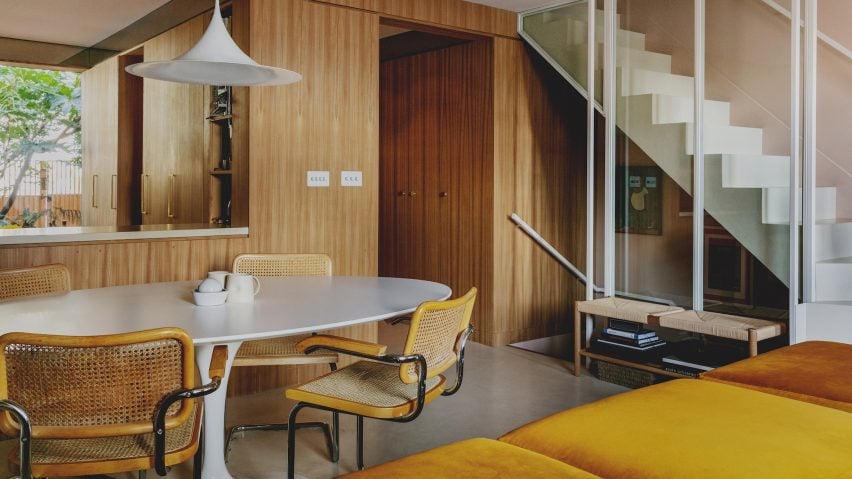Featuring wood-panelled walls, plushy seating and soft fabrics juxtaposed with glossy finishes, this lookbook collects 10 interiors that recall the 1970s.
Having been out of favour for much of the past five decades, the 1970s re-emerged as a design trend in 2022.
The interiors listed below draw on a range of motifs borrowed from the era of glam rock, roller discos and Star Wars, with low-slung, upholstered furniture in earthy tones filling multi-use spaces.
This is the latest in our lookbooks series, which provides visual inspiration from Dezeen's archive. For more inspiration see previous lookbooks featuring interiors with Eames chairs, living rooms in Victorian homes and open-plan modernist living areas.
Primrose Hill townhouse, UK, by Studio Hagen Hall
Architecture office Studio Hagen Hall channeled 1970s Californian modernism with its transformation of this north London townhouse.
Classically 1970s materials such as velvet, elm and fluted glass were deployed alongside subtle contemporary elements including micro-cement flooring.
Find out more about this Primrose Hill townhouse ›
SRG House, Australia, by Fox Johnston
SRG House was designed in 1972 by Stuart Whitelaw and was once the home of Australian modernist architect Sir Roy Grounds.
Fox Johnston retained this heritage in its renovation of the building, installing wood panelling and thick carpet while also leaving parts of the building's concrete fabric exposed.
Find out more about SRG House ›
Helios 710, UK, by Bella Freud and Maria Speake
Set inside the former BBC Television Center in London, Helios 710 is a penthouse apartment designed by architect Piercy & Company with interiors by creative duo Bella Freud and Maria Speake that seeks to capture the most vibrant aspects of the 1970s.
Aiming for "bold colour, eclecticism and glamour", the main living room sees glossy black sofas with burnt orange seat cushions contrast an emerald green carpet and hessian-covered walls.
Find out more about Helios 710 ›
Substans, Denmark, by Krøyer & Gatten
Local studio Krøyer & Gatten designed this Michelin-starred restaurant in Aarhus to feel like a Danish home from 50 years ago.
The architects opted for retro-but-humble materials, such as simple brown tiles in the kitchen and white-painted brickwork for the bar.
Find out more about Substans ›
6 Babmaes Street, UK, by Fathom Architects
The 1970s are often associated with a relaxed, comfortable aesthetic, and so the decade was referenced by Fathom Architects in its post-pandemic design for this London office.
Warm colours are paired with tactile materials to create a cosier atmosphere than the traditional office, as a response to the increased prevalence of working from home.
Find out more about 6 Babmaes Street ›
Palm Heights, Grand Cayman, by Gabriella Khalil
Creative director Gabriella Khalil sought to mimic a 1970s-era Caribbean mansion with the design of this boutique hotel in the Cayman Islands.
Sandy yellows mix with bold blues in each room, while collectible design pieces like Mario Bellini sofas, Ingo Maurer wall lamps and a chequered Ettore Sottsass rug feature in the guest lounge.
Find out more about Palm Heights ›
Youth Lab 3.0, Australia, by Nickolas Gurtler
This experimental space for cosmetic clinic Youth Lab takes on the daring task of balancing the brand's minimalist identity with a retro style reminiscent of 1970s Milan.
Designer Nickolas Gurtler paired a cooler overall colour palette and mirror wall with plentiful soft textures and shades of gold and olive green.
Find out more about Youth Lab 3.0 ›
Harmay Hangzhou, China, by AIM Architecture
While it may look just like a 1970s office, this interior by Shanghai studio AIM Architecture is actually a retail store for cosmetics brand Harmay.
It features a wool carpet by German brand Findeisen and suspended ceiling tiles, with a colour palette of muted yellows, oranges and browns.
Find out more about Harmay Hangzhou ›
Club Unseen, Italy, by Studiopepe
During Milan design week in 2018, local studio Studiopepe opened a temporary private venue in a 19th-century warehouse that attempted to capture the spirit of 1970s nightclubs.
"Those years are fascinating to us – the colours and materials were very glamorous," the studio's Arianna Lelli Mami told Dezeen. The interiors combined graphic shapes, grid patterns, pastel colours and metallic finishes.
Find out more about Club Unseen ›
Vesta, Canada, by Ménard Dworkind
This pizza joint in Montreal, designed by local studio Ménard Dworkind, takes cues from the decor of 1970s New York pizzerias with funky colours and bold use of textures, as well as a smattering of vintage objects.
White wall panelling, dark green ceiling paint, rich oak panelling and red leather seating come together to capture "the spirit of Italian family restaurants" from times gone by.
This is the latest in our lookbooks series, which provides visual inspiration from Dezeen's archive. For more inspiration see previous lookbooks featuring interiors with Eames chairs, living rooms in Victorian homes and open-plan modernist living areas.

